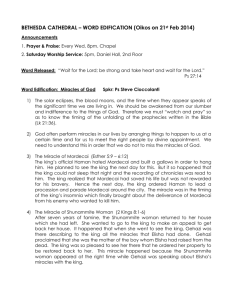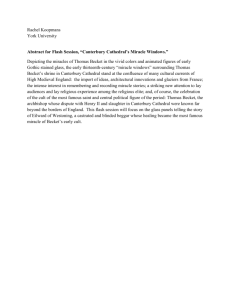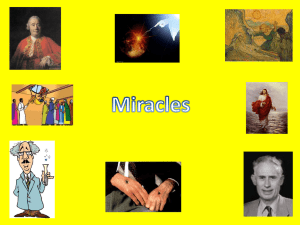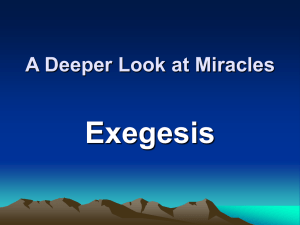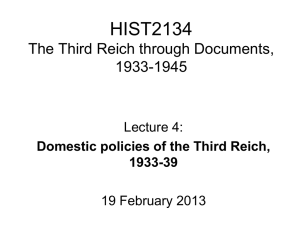famous divine
advertisement
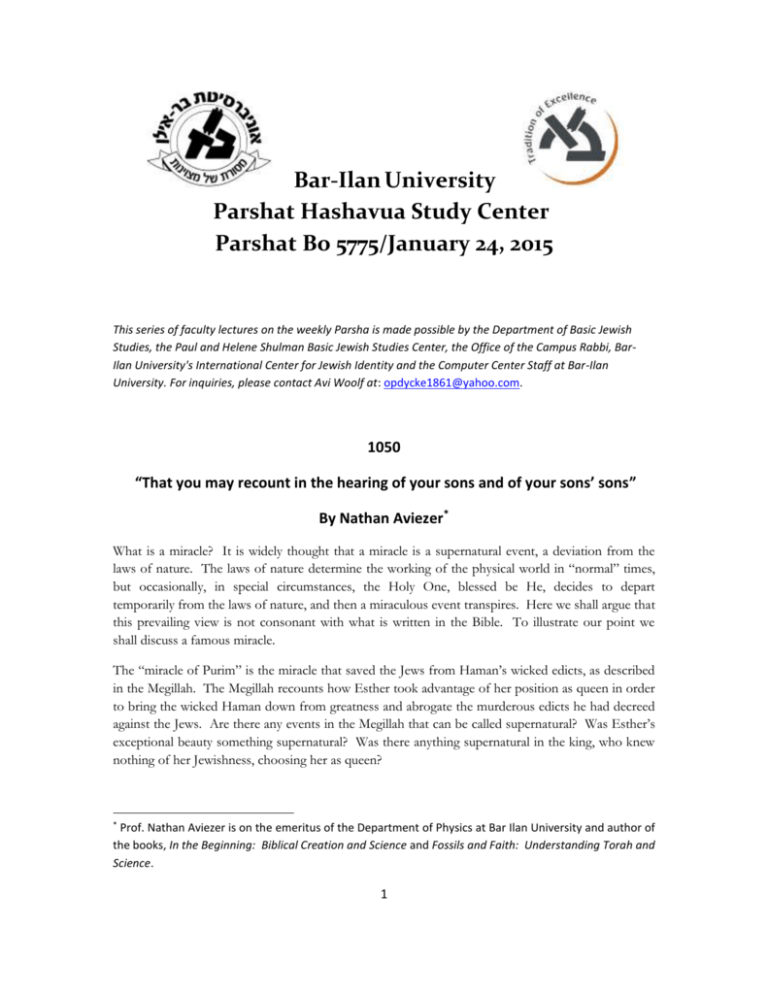
Bar-Ilan University Parshat Hashavua Study Center Parshat Bo 5775/January 24, 2015 This series of faculty lectures on the weekly Parsha is made possible by the Department of Basic Jewish Studies, the Paul and Helene Shulman Basic Jewish Studies Center, the Office of the Campus Rabbi, BarIlan University's International Center for Jewish Identity and the Computer Center Staff at Bar-Ilan University. For inquiries, please contact Avi Woolf at: opdycke1861@yahoo.com. 1050 “That you may recount in the hearing of your sons and of your sons’ sons” By Nathan Aviezer* What is a miracle? It is widely thought that a miracle is a supernatural event, a deviation from the laws of nature. The laws of nature determine the working of the physical world in “normal” times, but occasionally, in special circumstances, the Holy One, blessed be He, decides to depart temporarily from the laws of nature, and then a miraculous event transpires. Here we shall argue that this prevailing view is not consonant with what is written in the Bible. To illustrate our point we shall discuss a famous miracle. The “miracle of Purim” is the miracle that saved the Jews from Haman’s wicked edicts, as described in the Megillah. The Megillah recounts how Esther took advantage of her position as queen in order to bring the wicked Haman down from greatness and abrogate the murderous edicts he had decreed against the Jews. Are there any events in the Megillah that can be called supernatural? Was Esther’s exceptional beauty something supernatural? Was there anything supernatural in the king, who knew nothing of her Jewishness, choosing her as queen? * Prof. Nathan Aviezer is on the emeritus of the Department of Physics at Bar Ilan University and author of the books, In the Beginning: Biblical Creation and Science and Fossils and Faith: Understanding Torah and Science. 1 Chapter 6 of the Megillah describes the course of events beginning with the king having a sleepless night. Is there anything supernatural about a king not being able to sleep? Is that not something that happens to all of us at times? When the king cannot fall asleep, he asks to be read to from the chronicles of his kingdom. Is there anything supernatural about that? It is patently clear that all the events described in the Book of Esther took place according to the laws of nature. So what do we mean when we refer to the “miracle of Purim”? The miracle lies in the timing, not the nature, of the events. The Jews were delivered from Haman because each of the events described in the Book of Esther took place precisely at the moment that it did. That is the miracle of Purim. The Talmud writes: “Rabbi Isaac said: A blessing is found only in what is obscured from the eye.”1 Divine providence takes place in a manner “obscured from the eye,” that is, according to the laws of nature. Miracles take place and difficulties are resolved, but it all happens “obscured from the eye.” The miracles described in the Bible that indeed involved a departure from the laws of nature all occurred in private, without witnesses other than those individuals involved in the miraculous event. For example, take the famous miracles wrought by the prophet Elisha. One of them, the miracle of the oil, took place when the prophet came to the aid of a widow in distress. The destitute widow turned to the prophet and asked him to save her from her creditors, who sought to sell her two sons into slavery because she was unable to meet her debts.2 When Elisha heard that the woman had nothing in her house save for one jug of oil, he instructed her to borrow from her neighbors as many empty vessels as possible, and to fill them with oil from the jug in her possession. The widow did as the prophet bade her, and miraculously all the vessels that she gathered were filled with the oil that she poured from her single jug. She sold the vast quantity of oil and managed to pay all her debts and save her sons from the threat of enslavement. The main point for our discussion what Elisha instructed the widow to do before she began pouring the oil: “Then go in and shut the door behind you and your children.”3 This strange instruction assured that no one would be present at the miracle save for the widow herself and her sons who were helping her. Everything was “obscured from the eye.” Another point deserves mention: why was the miracle wrought with oil, of all things? Why did Elisha make the woman go to the trouble of borrowing vessels from her neighbors, of pouring vessel after vessel of oil, and then going out to sell the oil? Why did he not miraculously provide her with coins of silver and gold, for example? The answer is that the widow had in her possession a certain amount of oil, and the fact that she was selling oil did not appear to those around her as miraculous. But had the poor widow suddenly appeared with coins of silver and gold in her hands, the miracle would have been glaringly evident. 1 Bava Metzia 42a. 2 II Kings 4:1-7. 3 II Kings 4:4. 2 Other miracles in the Bible could be similarly analyzed, but the principle is clear: the objective of divine miracles is to achieve a certain result and not to impress an audience with wondrous tricks. Therefore the Bible keeps the supernatural aspects of its miracles as covert as possible. However, aside from the hidden miracle, “obscured from the eye,” there is another type of miracle. Sometimes the very objective of the miracle is to display it for all to see, the entire purpose being to show publicly the Lord’s greatness and might. In such cases, the public component of the miracle is of supreme importance. The most famous public miracle is without doubt Elijah’s contending with the prophets of Baal. Elijah wished to prove to the Israelites that Baal is nothing but a powerless pagan god, whereas the Holy One, blessed be He, the G-d of Israel, is omnipotent. To that end he proposed a public confrontation between himself and the prophets of Baal, in which a bull would be placed on a pile of wood as a burnt offering but no fire would be kindled. Each side would call on its god to bring about a miracle and cause fire to come down from heaven to kindle the wood and thus burn the offering. The Bible describes in great detail how Elijah mocked the prophets of Baal over the inefficacy of their gods in bringing down fire.4 When Elijah’s turn came to appeal to his G-d, he prayed silently to the Holy One, blessed be He, and was answered by a most impressive miracle that convinced all those present of the greatness and might of the G-d of Israel. The object of this miracle was to show the Israelites how vain and worthless it was to run after Baal, and to achieve this purpose great importance attached to the publicness of the miracle. Another example of a public miracle is provided by the Ten Plagues brought upon the Egyptians on the eve of the Israelites’ exodus from Egypt. What was the objective of the Ten Plagues, concluded in this week’s reading, Parashat Bo? This dramatic series of miracles was not wrought in order to destroy or punish the Egyptian people, for one plague would have sufficed to that end; rather, as stated in the Torah, the aim was: 1. “in order that you may know that there is none like Me in all the world…in order to show you My power, and in order that My fame may resound throughout the world,”5 2. “and that you may recount in the hearing of your sons and of your sons’ sons how I made a mockery of the Egyptians and how I displayed My signs among them.”6 In these words the Torah explains that the Ten Plagues were intended to glorify the name of the Holy One, blessed be He, in the eyes of the Israelites and of the entire world. In order to achieve this end the miracles of the plagues are not hidden, rather publicly displayed. According to Maimonides, believing that miracles occur is one of the tenets of faith in G-d.7 Rabbi Moshe Feinstein emphasizes8 the human beings are obliged to do their best and not rely on miracles, 4 I Kings 18:19-39. 5 Ex. 9:14-16. 6 Ex. 10:2. 7 Guide for the Perplexed 2:25. 3 however G-d is always watching over His world through hidden miracles, both through general and individual divine providence. Translated by Rachel Rowen 8 Iggerot Moshe, Orah Hayyim, Part II, resp. 111. 4


